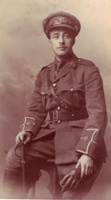
Photograph of Alfred in Tameside Local Studies and Archives Centre. Reference: MR4/17/172

(L to R) Military Cross; 1914-15 Star; British War Medal; Allied Victory Medal
Alfred was born in around July 1893 in Bolton, Lancashire. His father was called Joseph and his mother was Mary Ann. He had an older sister called Annie. The family had lost 2 other children by 1911, but we don't know their names. They were members of the Church of England.
In 1901 the family lived at 287 Lever Street in Bolton. Joseph worked as a carder in a cotton mill. Ten years later he had been promoted to assistant manager of a mill and the family had moved to 43 Burnham Avenue in Bolton.
When the First World War broke out in August 1914 Alfred was working as a clerk. His parents still lived at 43 Burham Avenue, but we don't know whether he did. He left his job and joined the 5th Battalion of the Loyal North Lancashire Regiment on the 4th September. This was a unit of the Territorial Force based in Bolton.
When he enlisted Alfred was 5 feet 5 inches tall and weighed 145 pounds. He had a 'medium' complexion, blue eyes and dark brown hair. He was given the service number 2425.
The 5th Battalion trained at Chipping Sodbury in Gloucestershire and Sevenoaks in Kent before being sent to France on the 12th February 1915. It was renamed the 1/5th Battalion at around this time.
After a quiet first few months, in mid June the battalion took part in fighting around Ypres in Belgium. They remained in this area until the end of the year, when they moved south into France.
Alfred had been promoted to Lance Corporal by March 1916. He had impressed his commanders and on the 17th he left the 1/5th Battalion. He had been selected to train as an officer. He was commissioned as a Second Lieutenant on the 24th September and joined the 21st Battalion of the Manchester Regiment 2 days later.
The battalion had recently finished its part in the Somme Offensive. It spent parts of October and early November in the front lines around Beaumont Hamel before going into the rear until the New Year.
Alfred and the 21st Battalion held trenches in the area around the Ancre River during the first months of 1917. He was able to take 10 day's leave between the 5th and the 15th February.
At some point during this period Alfred carried out an act of great bravery. He was awarded the Military Cross for it in the London Gazette of the 17th April 1917. This is his citation:
For conspicuous gallantry and devotion to duty. He led his platoon in a most gallant manner, driving the enemy out of their position and reaching his final objective.
We don't know exactly where or when this deed took place.
The 21st Battalion took its turns in the front lines and the rear areas during the rest of February and March. They moved to Courcelles on the 23rd March and served in this area until early May.
On the 10th May the battalion began moving towards Bullecourt. They were to support an attack on this village as part of the Battle of Arras. Alfred commanded a Company during this operation.
The attack went well, and the Germans began to launch counter-attacks to try and drive the British out of Bullecourt. The Battalion held on for 3 days, beating off 15 determined German attacks.
During this fighting the battalion lost 22 men killed and over 130 wounded. One of the dead men was Alfred. He was 23 years old.
Later in 1917 Joseph and Mary received Alfred's personal effects. There was a note case, containing around 85 French francs, some photographs and some letters. He was promoted to Temporary Captain for the week he spent in command of a Company, so they were also sent the increased pay that this rank attracted.
We don't know where Alfred was originally buried. Shortly after the end of the war in November 1918 the British began to move the bodies of men buried on the battlefield into larger cemeteries. On the 7th November 1919 Joseph and Mary were sent a letter telling them that Alfred's body had been 'carefully and reverently' reburied in Queaht Road British Cemetery. They lived at 72 Chorley Old Road in Bolton at this time.
Queaht Road Cemetery still exists, but Alfred is now buried with 825 other men in the Honourable Artillery Company Cemetery in Ecoust - St Mein. We don't know whether his body was moved again, or whether a mistake was made on the letter.
In May 1926 Joseph and Mary were informed that a stone headstone had been erected over Alfred's grave in the HAC Cemetery. They chose the personal inscription 'There is a corner of a foreign field shall be forever England'. Alfred's grave reference is 4. K. 2.




